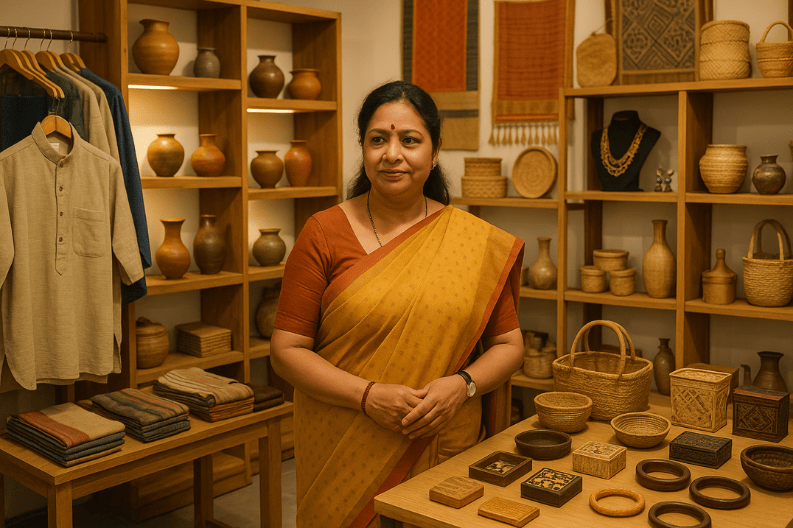Delhi Khadi Board to open large store featuring 650 Geographical Indication (GI)-tagged products in Connaught Place, Delhi. These products represent India’s cultural and traditional diversity, each recognized for its unique origin-based quality. The new store aims to promote handmade crafts, support artisans, and strengthen the “Vocal for Local” movement.
Chief Minister Rekha Gupta is leading this initiative, which will help artisans reach national and international customers. Mundatable Sirsa from the Khadi and Village Industries Board (KVIB) shared, “Under the leadership of CM Rekha Gupta, Delhi’s DKVIB Emporio will become a proud national platform for GI-tagged products, in line with Prime Minister Narendra Modi’s vision of ‘Swadeshi’ and ‘Vocal for Local.’”
This project will not only boost the sales of traditional goods but will also give artisans direct access to markets. The recent KVIB meeting discussed seventeen major topics, including ways to connect artisans to buyers, introduce training programs, and make legal improvements. The Board has also decided to hire legal experts to draft a new DKVIB Act and update the organization’s rules to make it more efficient.
Sirsa criticized the previous government for neglecting traditional crafts. He said that while they praised Mahatma Gandhi, they ignored his mission of empowering Khadi and rural artisans. This lack of support caused many local crafts to lose recognition and market value.
To revive this sector, the Delhi government has allocated ₹50 crore in the current budget. This fund will support training, marketing, and financial aid for artisans. Sirsa highlighted, “Our artisans have immense talent but lack access to proper markets. DKVIB will bridge that gap and bring dignity back to handmade work.”
Several senior officials, including A.C.S. Vipul Pathak, A.C.S. Prashant Goyal, D.S.I.I.D.C. M.D. Nazuk Kumar, and DKVIB M.D. Mahesh Kumar, attended the meeting. Representatives from NABARD were also present, offering financial insights to strengthen artisan enterprises. After the meeting, Sirsa inaugurated an exhibition at the DKVIB headquarters in Kashmere Gate. The event displayed eco-friendly products made from jute, handmade paper, and natural fibers.
Sirsa encouraged citizens to visit and support these exhibitions, stressing that community participation is key to preserving India’s heritage. The initiative reflects Mahatma Gandhi’s vision of empowering rural craftsmen through Khadi and sustainable living. It also aligns with global trends where customers increasingly prefer locally-made, eco-friendly products.
The new emporium promises to be a creative and lively space where artisans can showcase their craftsmanship. Visitors will experience the beauty and history behind each product, from fabrics and pottery to jewelry and home décor. This step will strengthen India’s local economy, promote sustainability, and protect the livelihoods of artisans.
In conclusion, the Delhi Khadi Board to open large store featuring GI-tagged products is more than a business project, it is a movement to revive traditional craftsmanship, empower artisans, and celebrate India’s cultural heritage. So, with strong leadership and community support, this initiative will bring pride, growth, and opportunity to the heart of Delhi.



